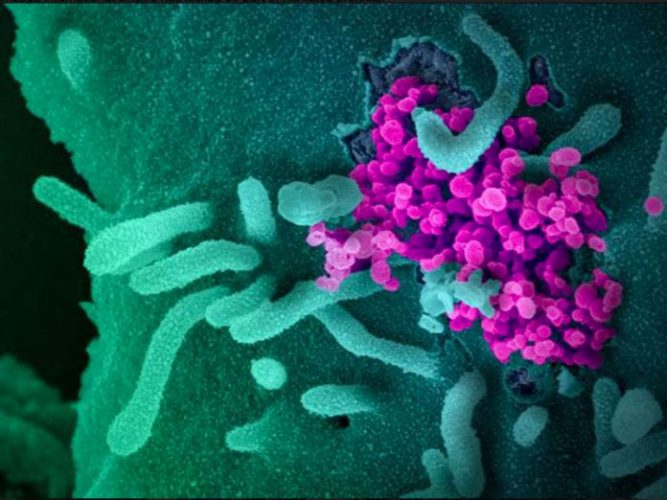Ports/COVID-19: A Call For Total Adherence to Professional Safety Measures, Security Best Practices

By Eugene Nweke
A Crisis Management Situation In The Port – A Call For Total Adherence To Professional Safety Measures & Security Best Practices:
With the following abridged response to Covid 19 Pandemic address by the President Commander In Chief of the Armed Forces Federal Republic Of Nigeria on Sunday 29th March, 2020, it is pointer to a Freight Forwarding Practice unusual:
“1. Fellow Nigerians,
2. From the first signs that Coronavirus, or COVID-19 was turning into an epidemic and was officially declared a world-wide emergency, the Federal Government started planning preventive, containment and curative measures in the event the disease hits Nigeria.
42. All seaports in Lagos shall remain operational in accordance with the guidelines I issued earlier. Vehicles and drivers conveying essential cargoes from these Ports to other parts of the country will be screened thoroughly before departure by the Ports Health Authority..
44. Accordingly, the Hon. Minister of Health is hereby directed to redeploy all Port Health Authority employees previously stationed in the Lagos and Abuja Airports to key roads that serve as entry and exit points to these restricted zones.
45. Movements of all passenger aircraft, both commercial and private jets, are hereby suspended. Special permits will be issued on a needs basis.
46. We are fully aware that such measures will cause much hardship and inconvenience to many citizens. But this is a matter of life and death, if we look at the dreadful daily toll of deaths in Italy, France and Spain.
47. However, we must all see this as our national and patriotic duty to control and contain the spread of this virus. I will therefore ask all of us affected by this order to put aside our personal comfort to safeguard ourselves and fellow human beings. This common enemy can only be controlled if we all come together and obey scientific and medical advice.
49. For residents of satellite and commuter towns and communities around Lagos and Abuja whose livelihoods will surely be affected by some of these restrictive measures, we shall deploy relief materials..
51. Furthermore, I have directed that a three month repayment moratorium for all TraderMoni, MarketMoni and FarmerMoni loans be implemented with immediate effect.
52. I have also directed that a similar moratorium be given to all Federal Government funded loans issued by the Bank of Industry, Bank of Agriculture and the Nigeria Export Import Bank.
56. As we all pray for the best possible outcome, we shall continue planning for all eventualities..
61. I want to assure you all that Government Ministries, Departments and Agencies with a role to play in the outbreak response are working hard to bring this virus under control.
63. I will therefore implore you again to strictly comply with the guidelines issued and also do your bit to support Government and the most vulnerable in your communities.”.
It is on the basis of the above contents (abridged address) that this professional modest derives its attention.
This address is not suggestive but an outright declaration of a crisis management situations in our Sea Ports and Logistics Supply Chain.
Under the prevalence Global emergency and response to Covid 19, erstwhile, globally the Seaports being a Ship/Cargo nodal point, as well as promoting beehives of a clustering of industrial activities are open for essential services purposes ( Customs – For Ship Rummaging and Berthings activities; Terminal Operators – For Cargo Reception, Inventory And Warehousing Operations; Shipping Lines – For Ship Husbandry & Crew Attendants; Designated Truckers – For Cargo Movements To Offdock Terminal, In The Case Of Cargo Overflow In The Port) and all other Port users and activities are shut out from operations, aimed to limit the movement of people under the prevailing circumstances, thereby fast tracking the curtailing of the spread of the crisis, which is not a physical crisis but a virus unseen with human eyes.
Understanding, that the Nigeria Port as at the time of this Covid out break was grappling with myriads of operational challenges, ranging from: “Overstretched Ports Capacity and Cargo Handling Equipments; Gridlocks within the Port Access Roads, Bad Port Access Roads, Long Dwell Time Of Vessels, Long Turn Around Trip Of The Truckers ( Limiting Fleets for prompt evacuation), whereby resulting to port congestions.
In view of this, it is understandable when the government declares the Sea Ports as “operational”, while other related international frontiers remains closed under the prevailing circumstances.
By this emergency policy declaration by the government, the Freight Forwarders being exposed to an unseen danger must weigh the extend of thier professional volnerability under this Crisis Management or emergency situations as they go about discharging thier professional obligations, in efforts to compliments the government gestures and directives.
It becomes more worrisome to a Freight Forwarders , understanding his work environment and knowing deeply that, Our Port System falls short or a total absence of :
The World Customs Organization Convention On:
a. Revised Kyoto Convention.
b. Revisd Alusha Integrity Declarations.
c. Framework of Standards to Secure and Facilitate Global Trade.
d. Integrated Supply Chain Management Guidelines.
e. Etc.
The International Standards Organization On:
a. ISO PAS 28000 – Security Management System For The Supply Chain.
b. ISO PAS 28000 – Best Practices For Custody In Supply Chain Security.
World Trade Organization On:
a. National Single Window Application/ ICT A.
b. Trade Agreements On Trade Liberalization and Facilitation Tools.
Other Focus And Considerations That Guarantee Safety and Security Of The Port System Which The Present Situation Has Brought To The Front Burner are professional base training and industry adoption, namely:
a. Supply Chain Security Best Practices Catalog.
b. Freight Security Requirements and Trucking Security Requirements.
c. Freight Transportation Security and Productivity.
d. Container Transport Security Across Modes
e. Enhancing Port Safety And Security Throughout The Port Supply Chain.
f. Understanding the Dynamics Trade, Port And Supply Chain Safety & Security.
g. Etc.
However, given to the circumstances the Freight Forwarders finds themselves, the question is: “What do we do in this crisis situation?”. The simple answer is to helplessly manage the crisis as it were, while trusting the power of the supernatural. Then followed with the question, “How do we manage the present crisis?”.
Here are my humble suggestions:
a. Judging from the strength of the address above, first, the Ministry Of Transport, The Council For Regulations Of Freight Forwarding Practice In Nigeria – CRFFN and The Accredited Freight Forwarding Associations, must make an official public declaration to the effect that, Freight Forwarders are Essential Services Providers – ESP and should be accorded such official Status for the consumption of the public, especially the Security operatives, to aide Identification and security planning purposes.
b. The CRFFN and The Accredited Associations should to set up a “Crisis Management Team” – CMT.
c. The Crisis Management Team will ensures:
i. Design A Successful Emergency Management Architecture – planning and handle various categories of contingencies.
ii. Contingency must be a continuous process subject to appropriate revisions.
iii. Contingency should involve the inculcating and maintaining awareness, providing necessary trainings and interventions.
iv. Personnel that will serve in the Contingency Planning Responsibilities ( CPR) must be familiar with Plans and Process ( P&P), also must be duly briefed or trained on the applicable techniques and methods
v. Determine a critical process interdependencies to drive the process assessment and information system.
vi.Define a critical port processes areas that requiring risks function and disciplines.
vii. Always conducting, planning and analysing the processes and impacts.
viii. Undertake the supervision of the Infrastructures Safety and Functionality – ISF.
ix. Developing Mitigation Strategies to promote ease of communication, ease of identification of practitioners, weigh pre-event actions, put in place tools to wade off interruptions, etc.
x. Planning for professional and industry process restoration and normalcy leading to end of crisis.
d. Further Emphasis On Crisis Management Situations:
In addition, the CRFFN and the Accredited Associations Leadership must also constitute a “Business Continuity Team – BCT” to work closely with the CMT saddled with Contingency Planning Responsibilities.
For clarifications, Crisis Management is the process of managing events in a crisis within an industry till stability is restored. Covid 19 does no longer call for an incident management, requiring an emergency response because it has escalated into global crisis spreading rapidly from person to person, hence, the need for Crisis Management Team – CMT, who take over the management of the incidents that have developed beyond the capability and decision of an authorized regulator.
The Crisis Management Team – CMT of a given profession serves as a professional multi disciplinary, monitoring and enforcement task force’s comprises skilled professionals representing different disciplines coming together on short time basis to work on a specific issue or tasks. They are to collaborate other similar body’s constituted for such tasks , most!y at macro level.
The Business Continuity Team -” BCT” works closely with the “CMT” with sole duty to maintain good media relations to ensure that data and operational informations are disseminated without causing further damages or compounding the crisis on ground. This must be done in much professional manner.
e. Making Resources Available :
From item 51 & 52 of the address, Mr President dwelled on Moratoriums ( Government intervention funds/loans), regrettably the Freight Forwarders interest were down played or was never given emphasis.
However, it behooves on the Regulatory Body CRFFN and the Accredited Associations to sources fund from the government and make the same available to champion the tasks of undertaking an effective Crisis Management Situations, as prevalent.
Conclusion:
This Modest understands the inherentdivision amongst the Accredited and Non Accredited Associations, where Associations Nomenclature divides the collective interests, rather promotes internal Supremacy tussles. Worst still, the Association and leadership interests comes first before the professional interests, and most often the rgualatee rates itself far above the regulator, even with a feeling and show of unregulateable.
In view of this professional disjointedness, professionalism ( best practices and integrity) are sacrificed on the altar of self-centeredness across board. Thereby whittling down government and public respects of the Forwarders, which suggests why the professional title of revenue collectors seems to have eluded the Forwarders to the Customs , who are merely revenue assessors.
It is most understood why an ideal setting under the prevailing circumstances is not being canvassed nor recourse to professional relevance hence, the government non references in the categorization of exempted workers with status of essential services providers.
The Freight Forwarders, seems to have lost their place of industry pride, but suffice to say it not a permanent condition.
Finally, It most advisable for Forwarders to take there the COVID 19 seriously. Your life is what you make it. Obey all layer down guidelines and safety measures instituted so far. As you go about your professional services, think Safety and think about the lives of your love ones for whom sake you are under the sun/rain even in the prevailing circumstances.
Stay away from the port when you having nothing to do in the port. Avoid crowded environment, maintain Isolation as much as you can, it is for your own good. Covid 19 is a phase, we shall be alive to witness it pass without consuming any Forwarder.
Thanks.
Fwdr Dr Eugene Nweke.
For: Sea Empowerment Research Center Ltd GT.





